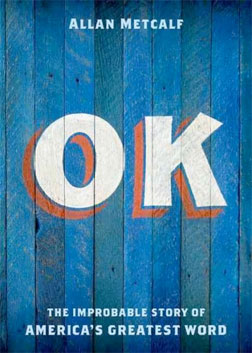 | |
 Now playing: Slate V, a video-only site from the world's leading online magazine. Visit Slate V at www.slatev.com. Now playing: Slate V, a video-only site from the world's leading online magazine. Visit Slate V at www.slatev.com. | |
books My OK, Your OK A history of the word fails to fully appreciate its ambiguity. Posted Wednesday, Dec. 1, 2010, at 10:20 AM ET
For Allan Metcalf, MacMurray College professor and author of OK, my friend's two-letter, one-word rejoinder is "by far the most successful American creation in language." It is also the "most frequently spoken (or typed) word on the planet." Like fast food, OK spread from the United States to the world; you'll hear it in Holland, Germany, Sweden, Poland, Finland, Italy, Spain, Wales, Israel, Korea, and Japan, among other countries, with, of course, slight variations in pronunciation. Paradoxically, a word that causes confusion when spoken (or typed) without sufficient context is also universally intelligible. To continue reading, click here. Juliet Lapidos is a Slate associate editor.Join the Fray: our reader discussion forum What did you think of this article? POST A MESSAGE | READ MESSAGES Also In Slate Alan Simpson and Erskine Bowles Want To Scare the Bejesus Out of You Foreign College Students Are Great for the Economy. Here's How To Get More of Them. The Kardashians Have Killed Their Especially Sleazy Prepaid Debit Card. Hurray! | Advertisement |
Manage your newsletters on Slate Unsubscribe | Newsletter Center | Advertising Information | |
Ideas on how to make something better? Send an e-mail to newsletters@slate.com. | |
Culturebox: My OK, Your OK
Subscribe to:
Post Comments (Atom)

No comments:
Post a Comment